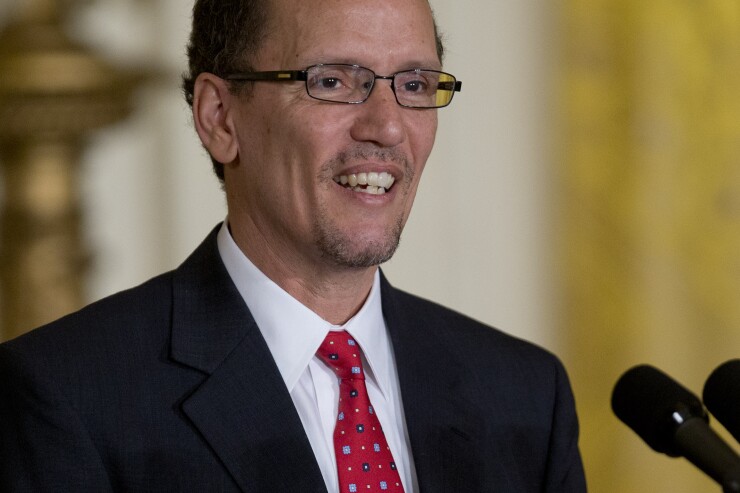The Department of Labor this morning will release its long-awaited final fiduciary rule, which is likely to require employers and their benefit advisers to revamp their communications and advice-giving practices for some retirement plans.

During a White House press briefing yesterday, Labor Secretary Thomas Perez said that while the rule was altered significantly from the original proposal, in an effort to assuage industry concerns over compliance requirements, it remained steadfast to its overarching goal of protecting middle class workers and investors. One change is that the timeline for compliance has been extended to January 1, 2018.
The new rule will designate anyone providing investment advice for retirement plans as a fiduciary, requiring advisers, planners and wealth managers to place their clients' financial interests ahead of their own. Advisers must also disclose any potential conflicts of interest to plan participants, and failing to do so would expose them, as well as the employers that hire them, to lawsuits and ERISA-violation penalties.
The final rule will also clarify what does—and does not—constitute fiduciary advice. Included are examples of communication that do not rise to the level of a recommendation, and thus would not be construed as advice. In particular, it specifies that education is not included in the definition of retirement investment advice, freeing advisers and plan sponsors to continue to provide general education on saving for retirement without assuming fiduciary responsibilities.
“The best interest of the consumer should remain the top priority for advisers and HR professionals alike, and it appears that this ruling is aiming to do just that – protect the consumer,” says Jeff Oldham, VP, Benefitstore, at Benefitfocus. But he adds that the additional time and financial resources required by the ruling “could have a negative impact on the industry if not handled with care.” Only time will tell, he says, “if these were resources well-spent, and what kind of benefit consumers will see in the long run.”
Other changes to the proposed rule, cited by Perez, will include:
- Definitions of a variety of investment education activities that fall short of fiduciary conduct. The final rule will also make it clear that advisers are not acting as fiduciaries merely by recommending that a customer hire them to render advisory or asset management services. The rule states that investment advice does not include communications that a reasonable person would not view as an investment recommendation, including general circulation newsletters, television, radio, and public media talk show commentary, remarks in widely attended speeches and conferences, research reports prepared for general circulation, general marketing materials and general market data.
- Removing all appraisals—and not just ESOP appraisals as in the original proposal—from the category of investment advice.
- Best interest contract (BIC) exemptions for more types of investment advice. For example, a BIC exemption will be available for providing advice to small businesses that sponsor 401(k) plans, as well as for offering advice to IRA and plan participants. In addition, under the final rule, recommendations to plan sponsors who manage more than $50 million in assets (versus $100 million in the proposed rule) will not be considered investment advice and will not require an exemption, if certain conditions are met.
- Dropping the contract requirement for ERISA plans and their participants and beneficiaries. Firms must still acknowledge in writing that they, and their advisers, are acting as fiduciaries when providing investment advice to a plan, participant, or beneficiary, but no contract will be required.
Other changes will include eliminating certain disclosure requirements that advisers and their firms had argued would be too burdensome.
A uniform fiduciary standard is long overdue, says Brian Menickella, co-founder and managing partner of The Beacon Group of Companies. He maintains that the DOL’s fiduciary rule will prove to be “the most sweeping regulatory reform in 76 years and one of the biggest systematic shifts for the retirement industry since 1974, when Congress first voted the 401(k) plan into existence.”
The new regulation “will cure the practice of advisers encouraging retirement plan participants to roll money out of their 401(k) plans and into high, front-end commission products.”
Among its many benefits, Menickella says the new regulation “will cure the practice of advisers encouraging retirement plan participants to roll money out of their 401(k) plans and into high, front-end commission products.”
But not everyone is so enthusiastic. Numerous organizations, including the U.S. Chamber of Commerce, have threatened to immediately file lawsuits on the heels of the rule's release, says Mercer Bullard, founder of Fund Democracy, an advocacy group for mutual fund shareholders.





